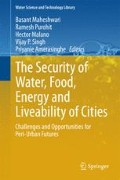Abstract
Quantification of greenhouse gas emissions for decentralised water supply systems is essential for water policy development, decision making and implementation of these systems. Two potential water supply strategies ‘Effluent Reuse’ and ‘Stormwater Harvesting’ applicable for the planned growth centre development of Western Sydney were developed. The associated energy intensities and operational greenhouse gas emissions of these two strategies were quantified by using the factors and methods prescribed by the Department of Climate Change and Energy Efficiency National Greenhouse Accounts Factors, 2011. It was found that in terms of operational greenhouse gas emissions, stormwater harvesting performs marginally better than effluent reuse while the cost of stormwater harvesting is expected to be about four times cheaper than effluent reuse in Australia.
Access this chapter
Tax calculation will be finalised at checkout
Purchases are for personal use only
References
City of Melbourne (2011) WSUD guidelines: applying the model WSUD guidelines, an Initiative of the inner Melbourne action plan. http://www.melbourne.vic.gov.au/Environment/SavingWater/Documents/WSUD_Guidelines.PDF. Accessed 16 Nov 2011
Cook S, Hall M, Gregory A (2012) Energy use in the provision and consumption of urban water in Australia: an update. CSIRO: Water for a Healthy Country National Research Flagship, CSIRO and Water Services Association of Australia
DCC and EE (2011) National greenhouse accounts factors, July 2011. Commonwealth of Australia, ISBN: 978-1-921299-86-5, p 77
Grant T, Opray L, Grant A, Sharma AK, Mitchell VG, Pamminger, F (2006) Life cycle aspects of alternative water and sewage servicing. In: Deletic A, Fletcher T (eds) Proceedings of 7 UDM and 4WSUD: urban drainage modelling and water sensitive urban design conference 2006, Melbourne, 5–6 Apr 2006, pp 121–128
Kenway SJ, Priestley A, Cook S, Seo S, Inman M, Gregory A, Hall, M (2008) Energy use in the provision and consumption of urban water in Australia and New Zealand. CSIRO: Water for a Healthy Country National Research Flagship, CSIRO and Water Services Association of Australia, ISBN: 978 0 643 09616 5, p x + 50
Manjusha (2011) Rain water collection. http://www.mastanantapur.com/rainwater.html. Accessed 16 Nov 2011
Marsden J, Pickering P (2006) Securing Australia’s urban water supplies: opportunities and impediments. Marsden Jacob Associates, Camberwell, Victoria, p xi + 58
Melbourne Water (2011) Urban stormwater harvesting: what does an urban stormwater harvesting scheme look like? http://www.melbournewater.com.au/content/drainage_and_stormwater/stormwater/urban_stormwater_harvesting.asp. Accessed 16 Nov 2011
Mitchell C, Retamal M, Fane S, Willetts J, Davis, C (2008) Decentralised water systems creating conducive institutional arrangements. Paper presented at enviro 08 Australasia’s environmental and sustainability conference and exhibition, Melbourne, 5–7 May 2008, pp 1–9
Perera BJ, James B, Kularathna MD (2005) Computer software tool REALM for sustainable water allocation and management. J Environ Manage. doi:10.1016/j.jenvman.2005.06.014
Retamal M, Turner A (2010) Unpacking the energy implications of distributed water infrastructure: how are rainwater systems performing? Water Sci Technol. doi:10.2166/ws.2010.136
Roads and Traffic Authority (2007) Sydney urban corridor strategy: building our national transport future. Department of Transport and Regional Services, Commonwealth of Australia, ISBN: 978-1-921095-49-8, p iii + 29
Tyson A, George BA, Aye L, Nawarathna B, Malano H (2012) Energy and greenhouse gas emission accounting framework for groundwater use in agriculture. Irrig Drainage. doi:10.1002/ird.1645
Acknowledgments
The authors gratefully acknowledge the considerable assistance from the members of the Water and Land Management Innovation and Sustainability Enhancement Partnership in Peri-urban Research (WISER) project team. The authors also gratefully acknowledge the helpful comments and suggestions of the reviewers, which have improved the presentation.
Author information
Authors and Affiliations
Corresponding author
Editor information
Editors and Affiliations
Rights and permissions
Copyright information
© 2014 Springer Science+Business Media Dordrecht
About this chapter
Cite this chapter
Aye, L., Nawarathna, B., George, B., Nair, S., Malano, H. (2014). Greenhouse Gas Emissions of Decentralised Water Supply Strategies in Peri-urban Areas of Sydney. In: Maheshwari, B., Purohit, R., Malano, H., Singh, V., Amerasinghe, P. (eds) The Security of Water, Food, Energy and Liveability of Cities. Water Science and Technology Library, vol 71. Springer, Dordrecht. https://doi.org/10.1007/978-94-017-8878-6_27
Download citation
DOI: https://doi.org/10.1007/978-94-017-8878-6_27
Published:
Publisher Name: Springer, Dordrecht
Print ISBN: 978-94-017-8877-9
Online ISBN: 978-94-017-8878-6
eBook Packages: Earth and Environmental ScienceEarth and Environmental Science (R0)

